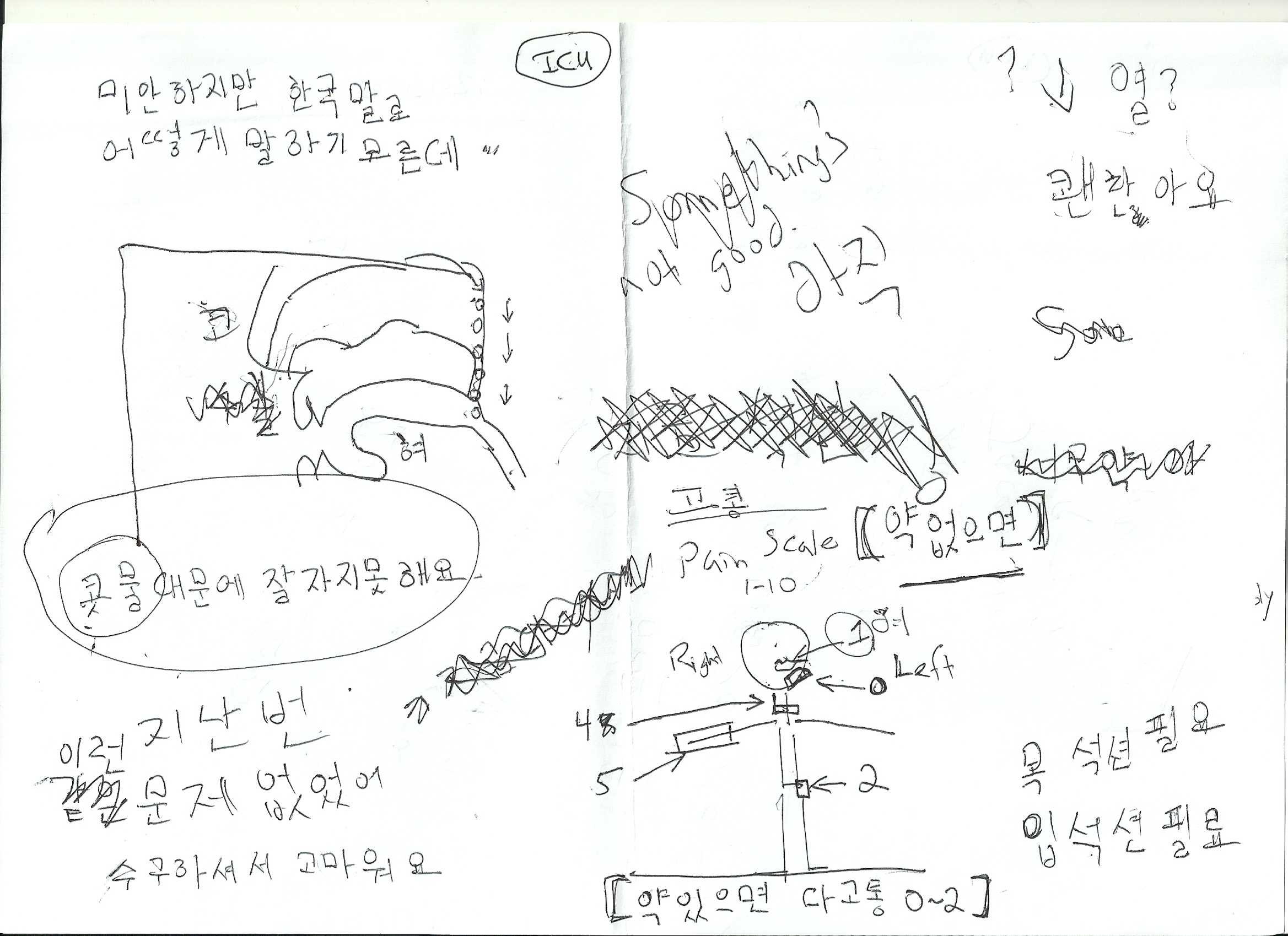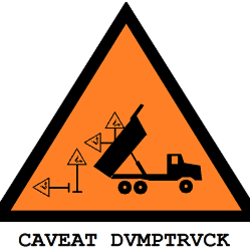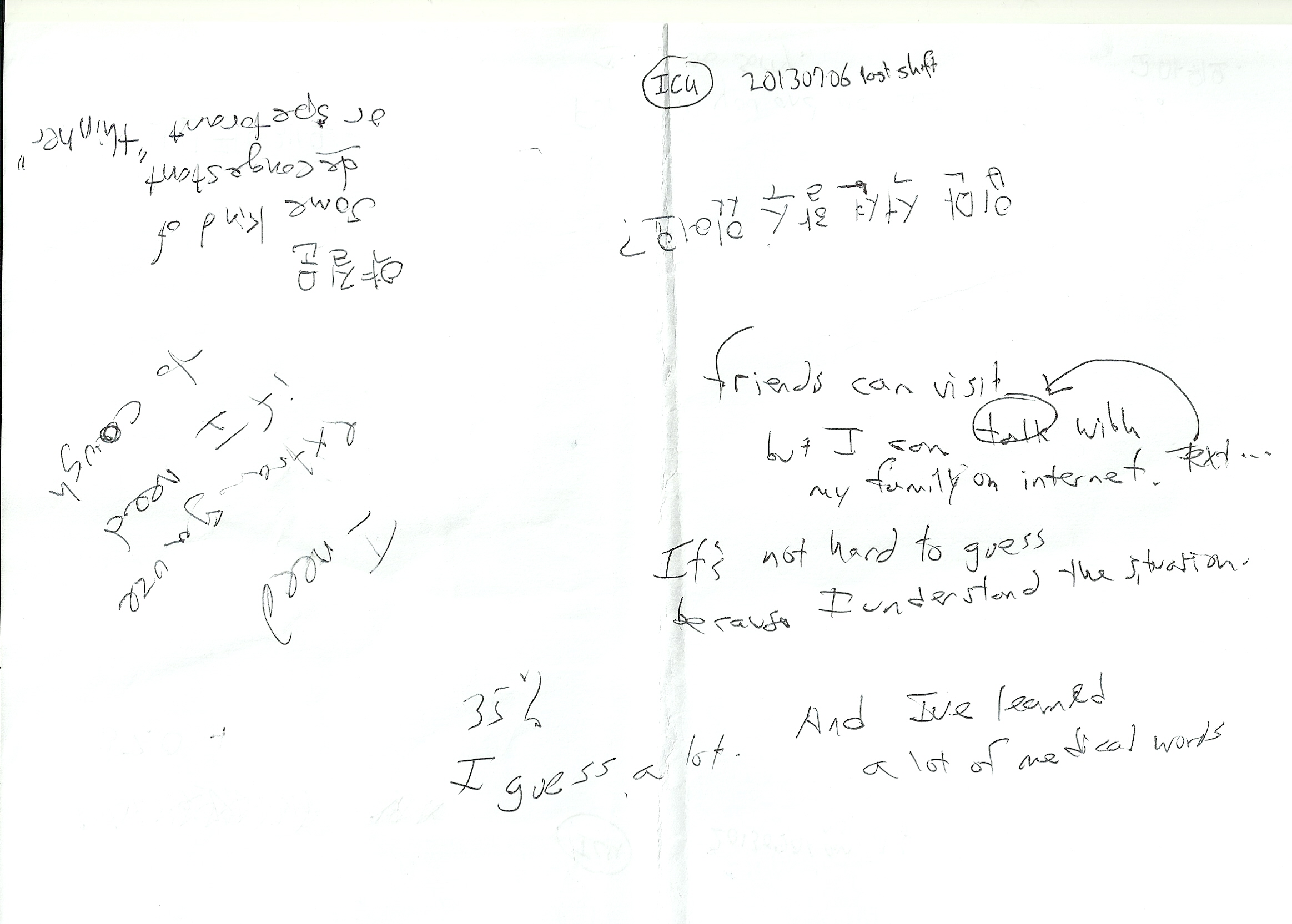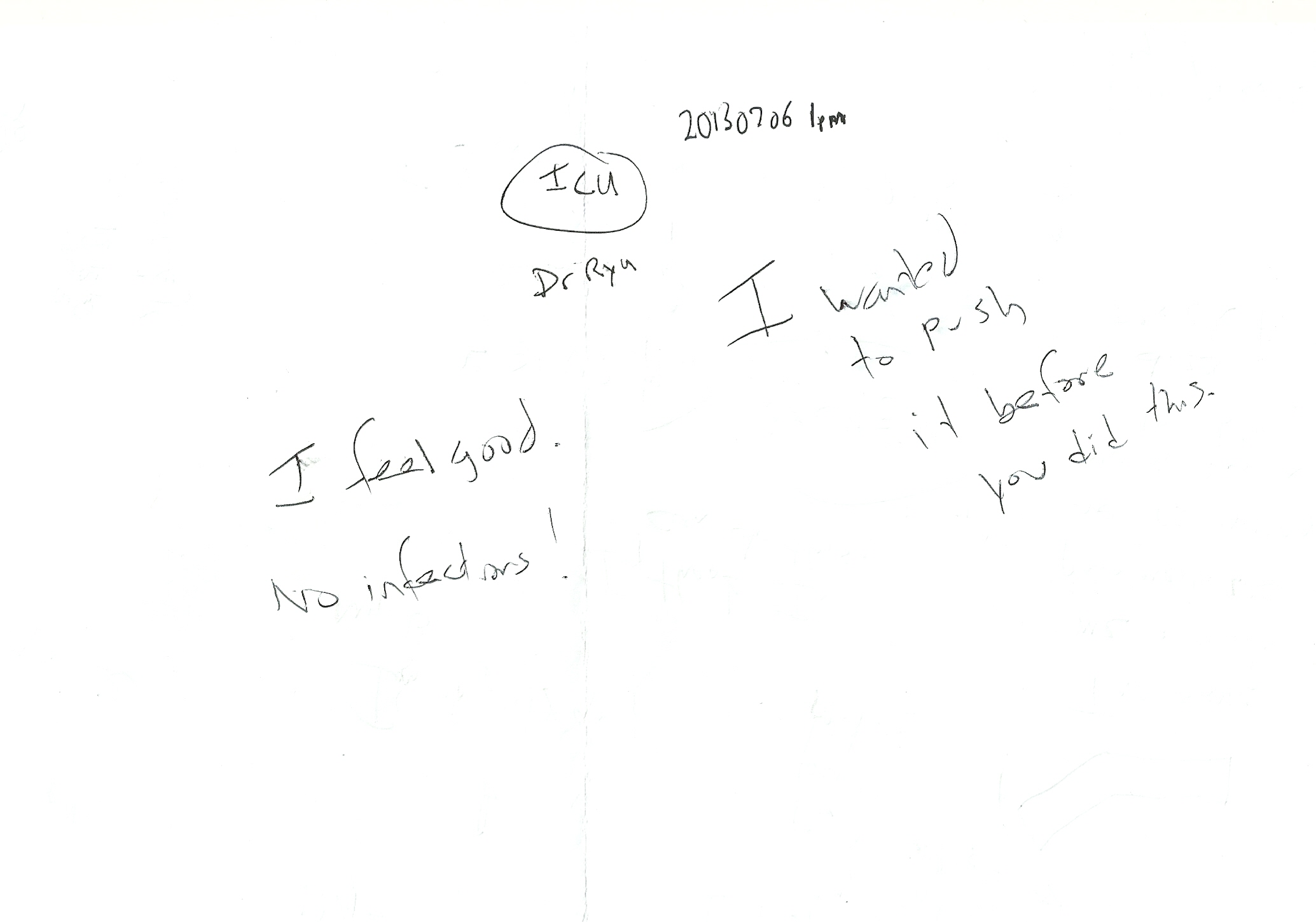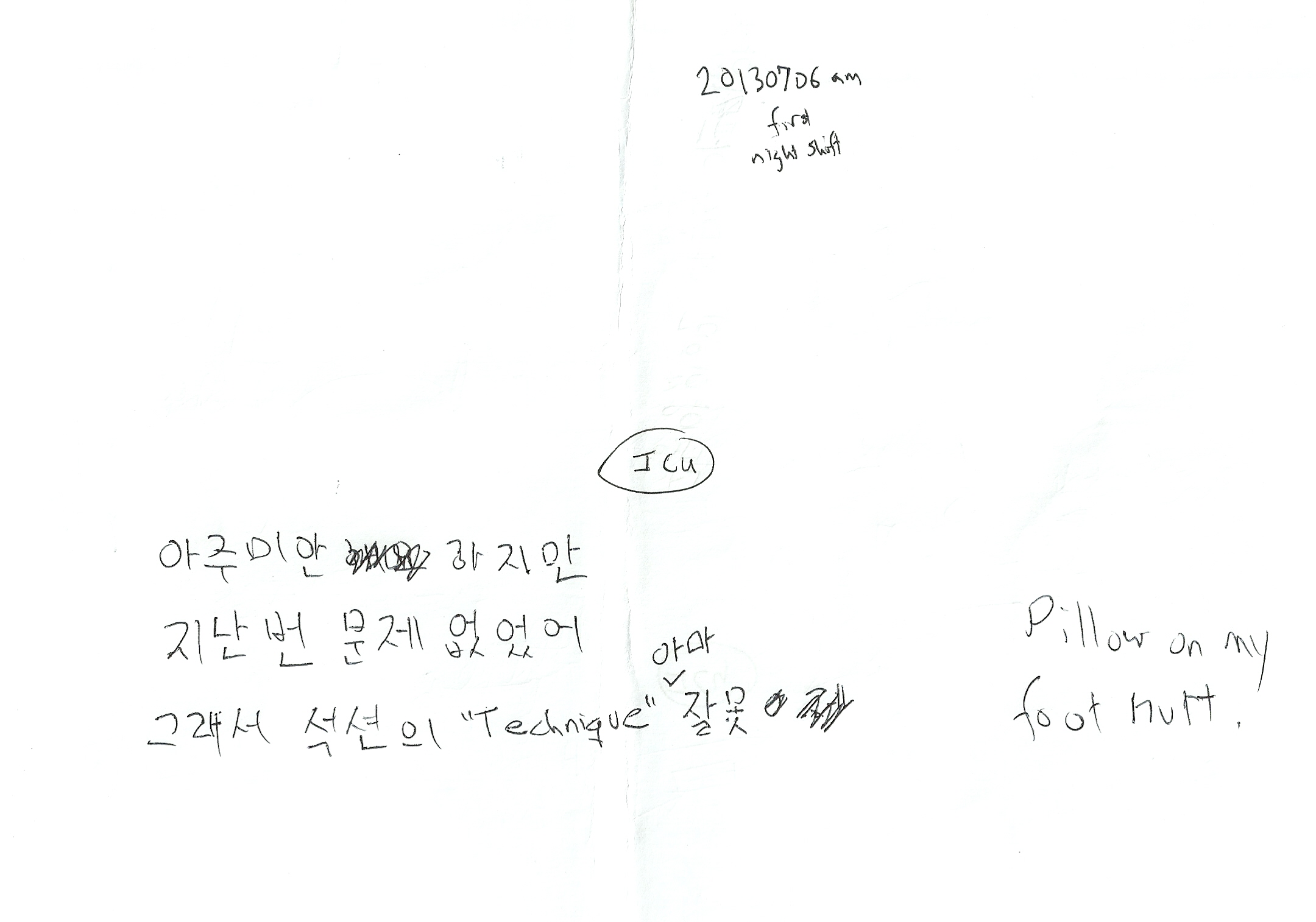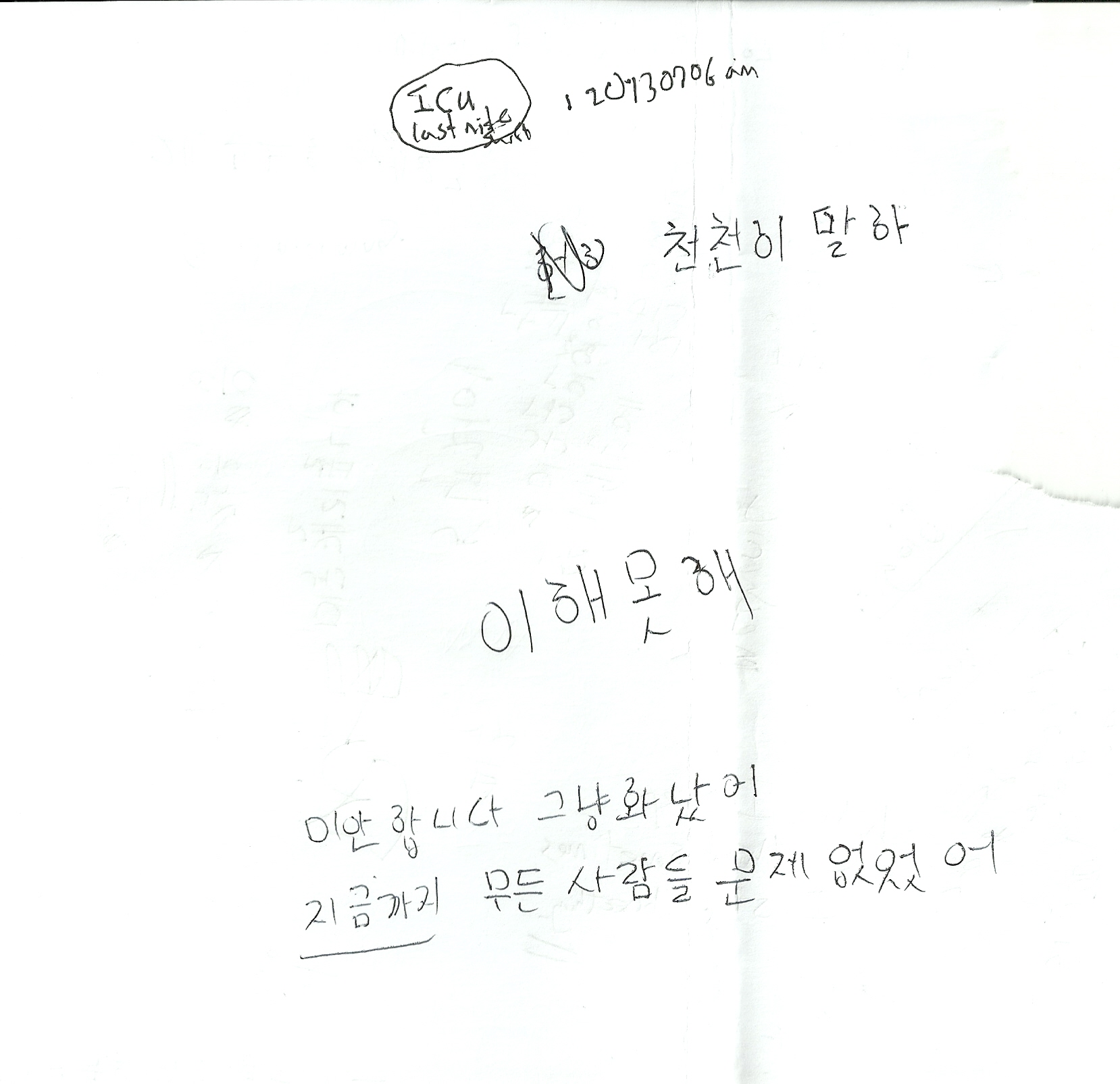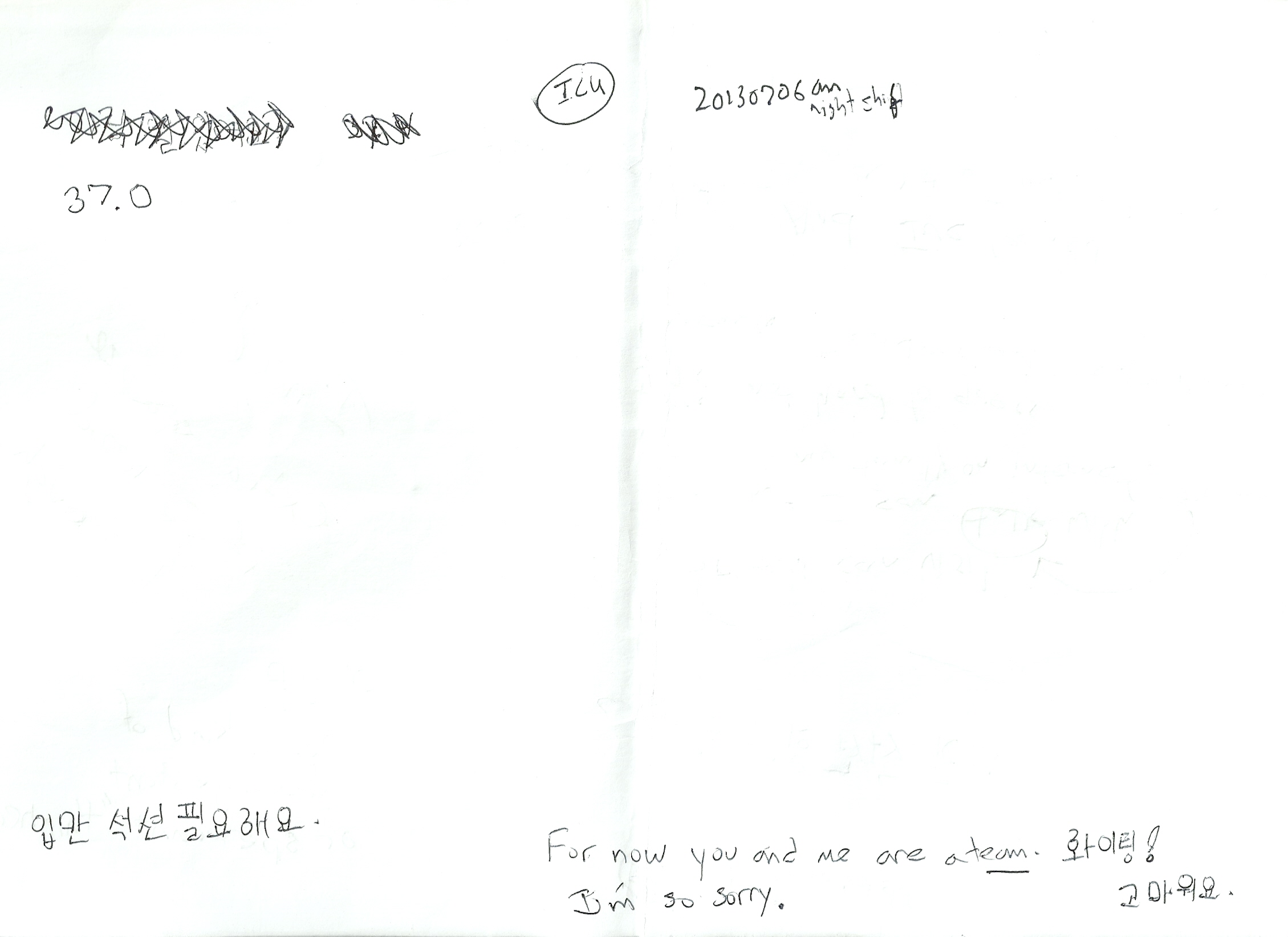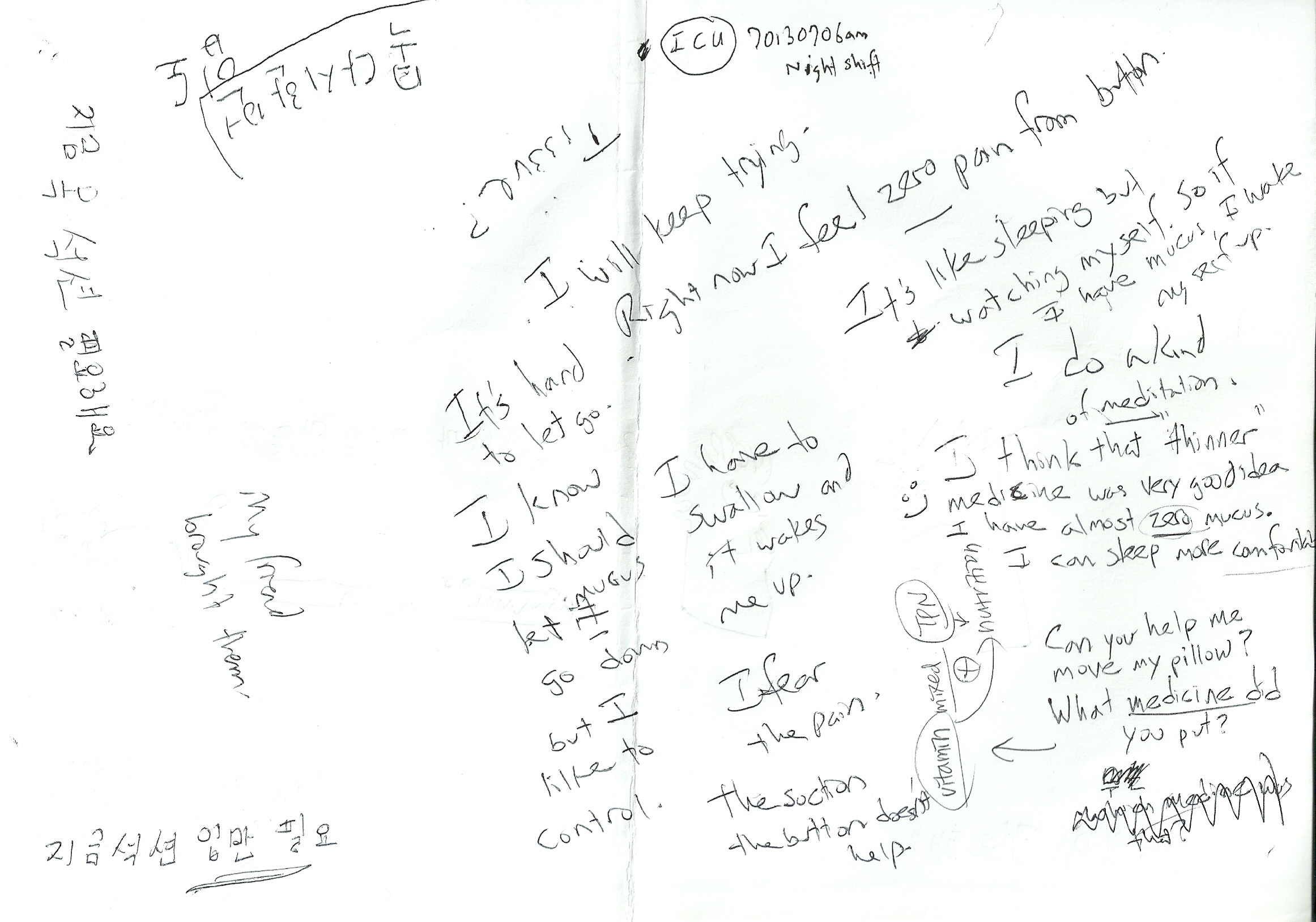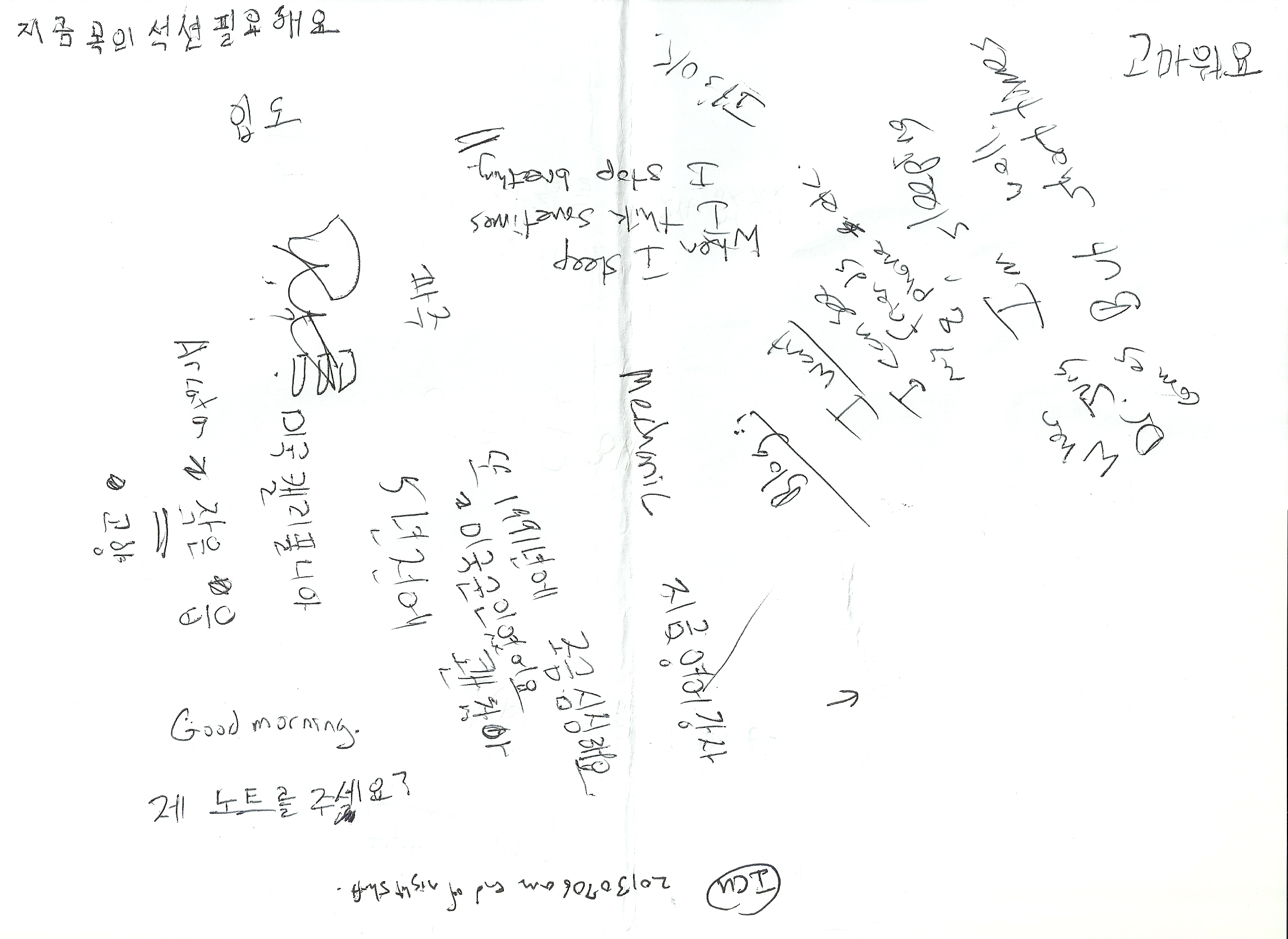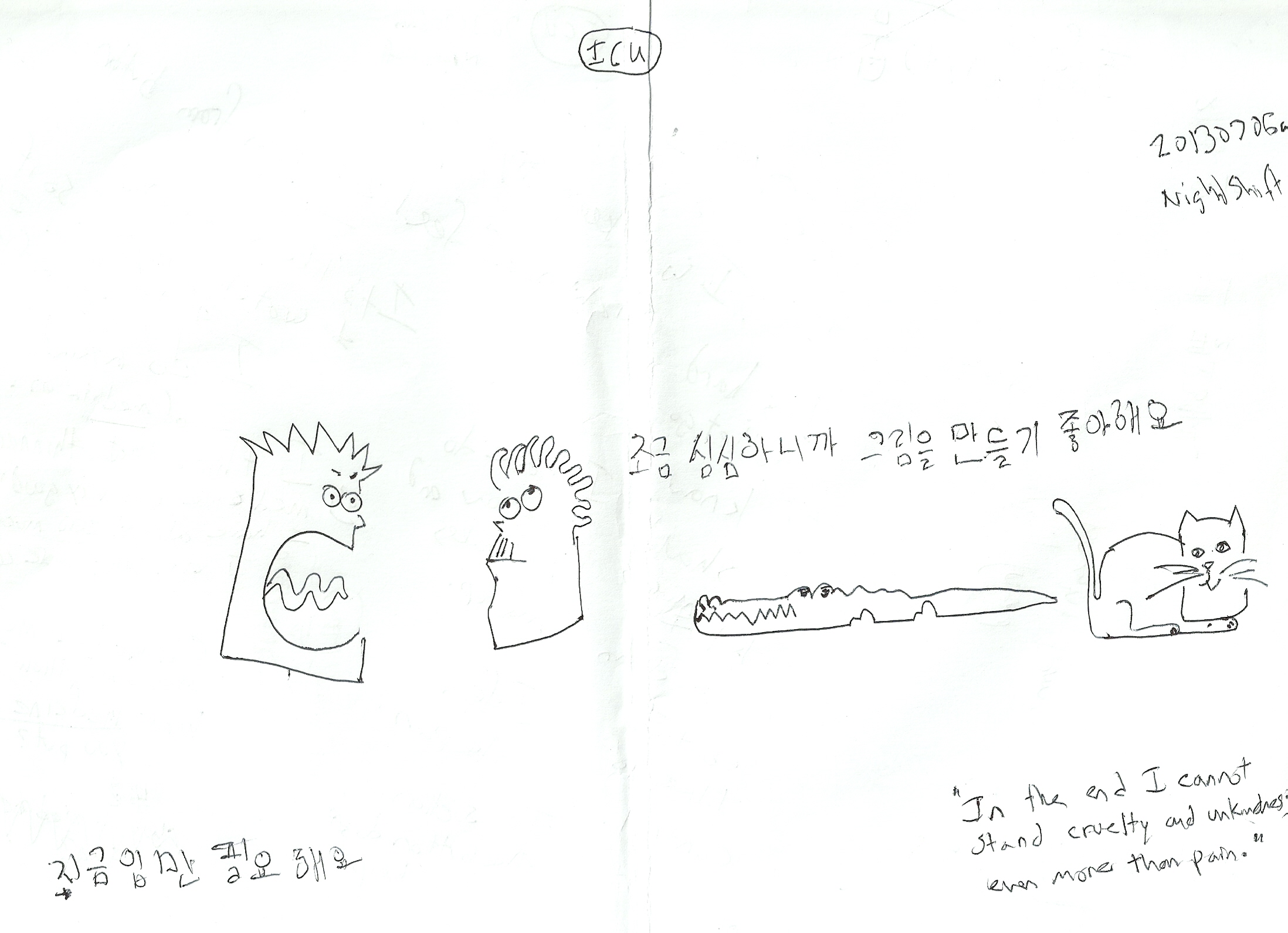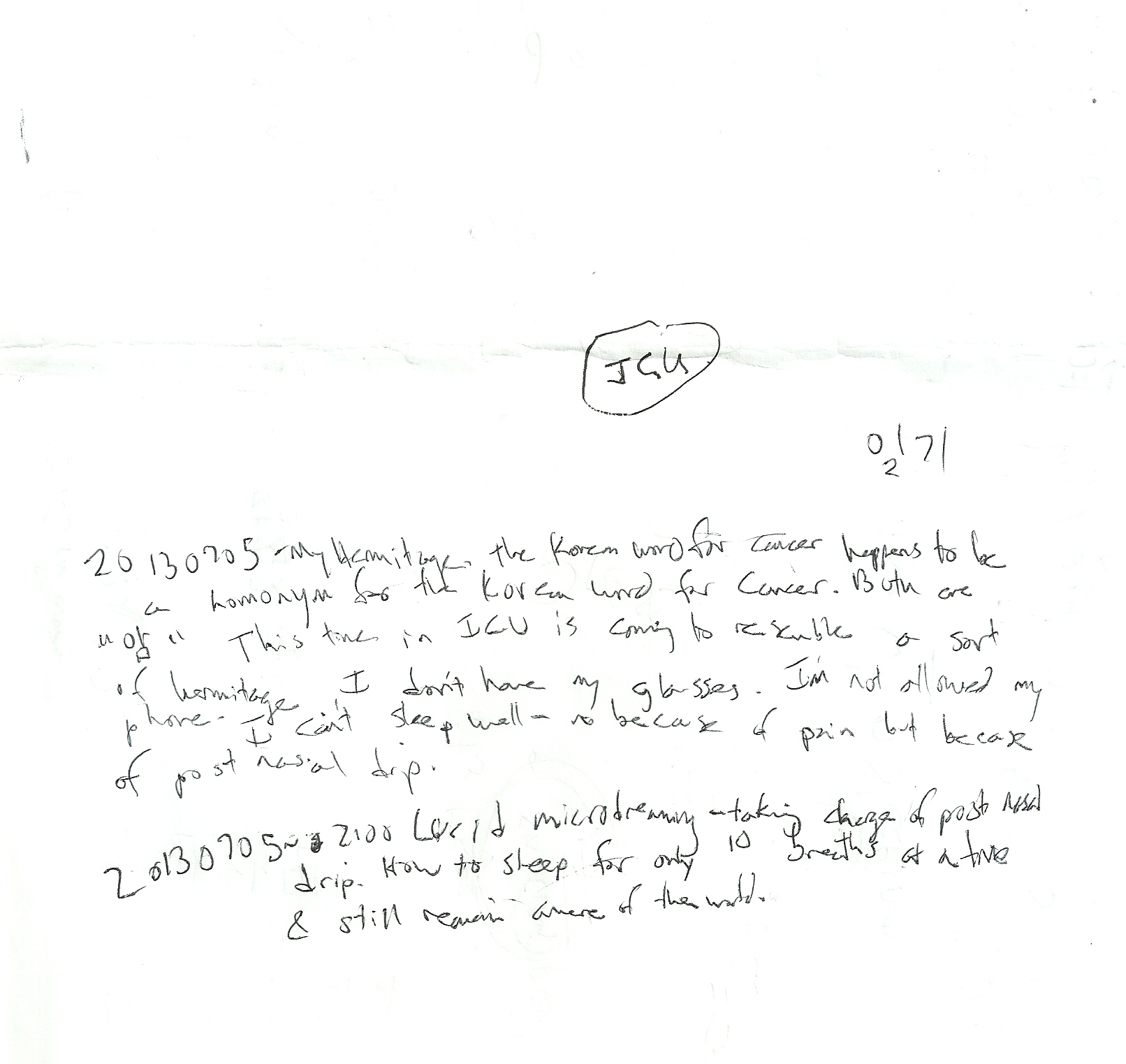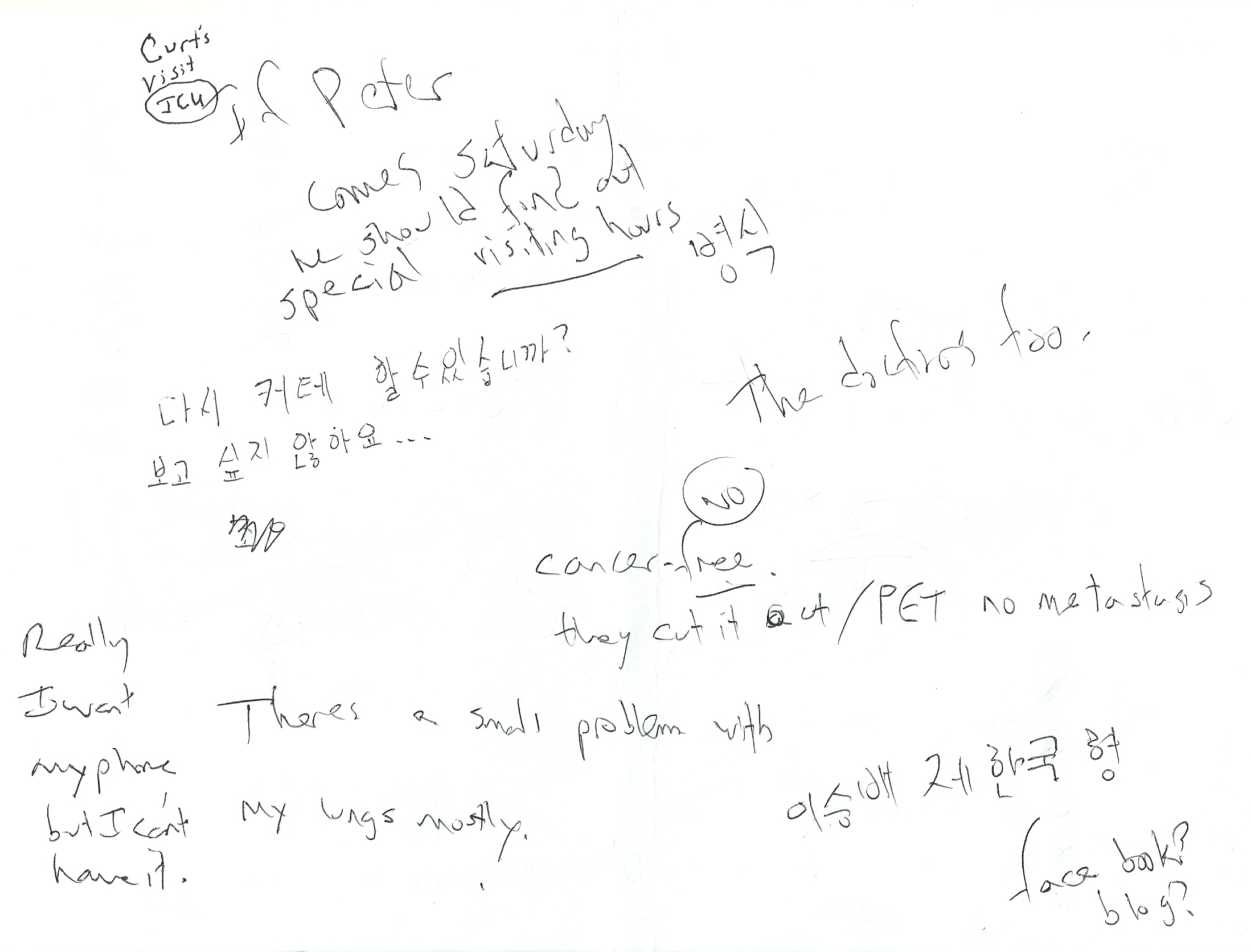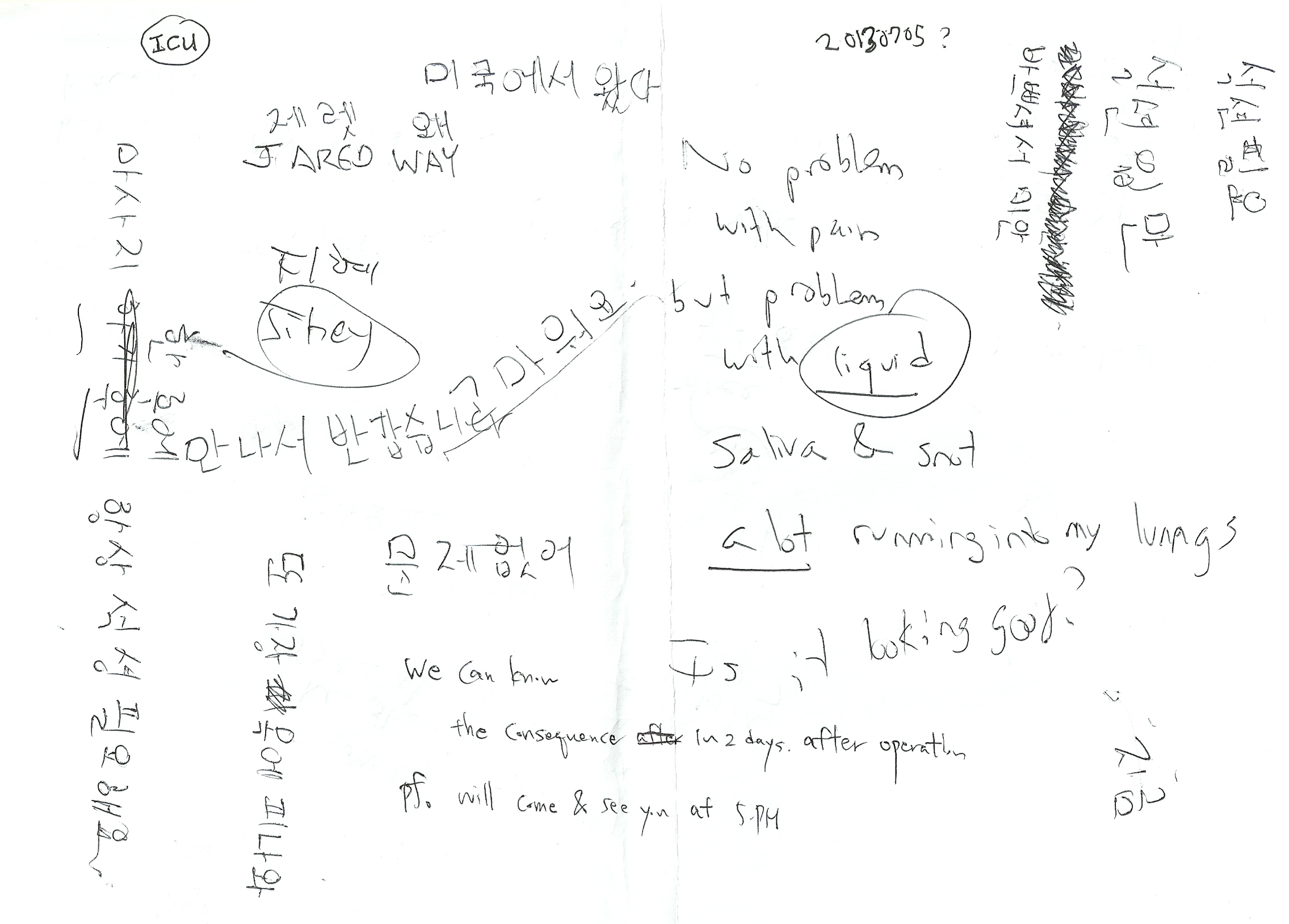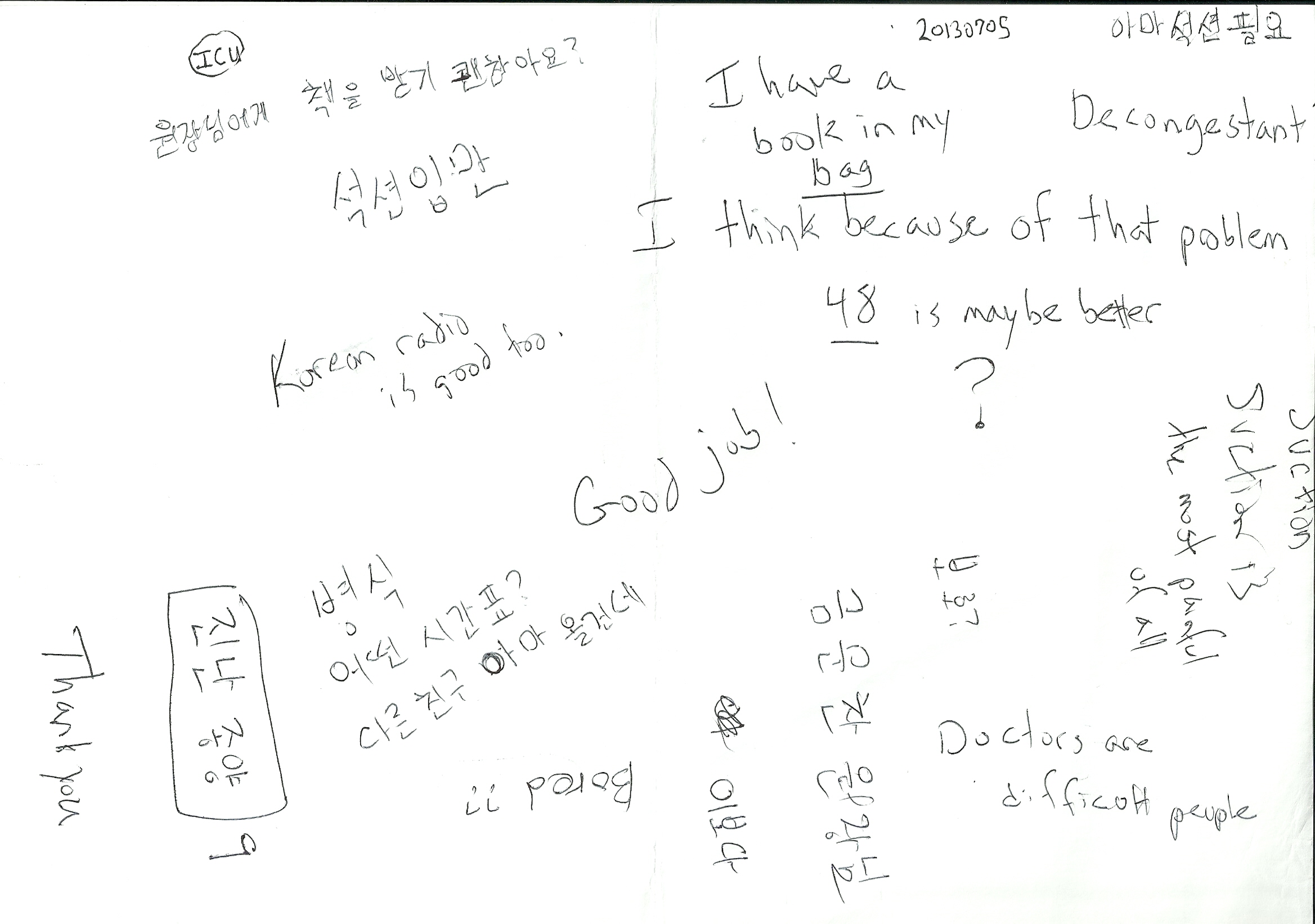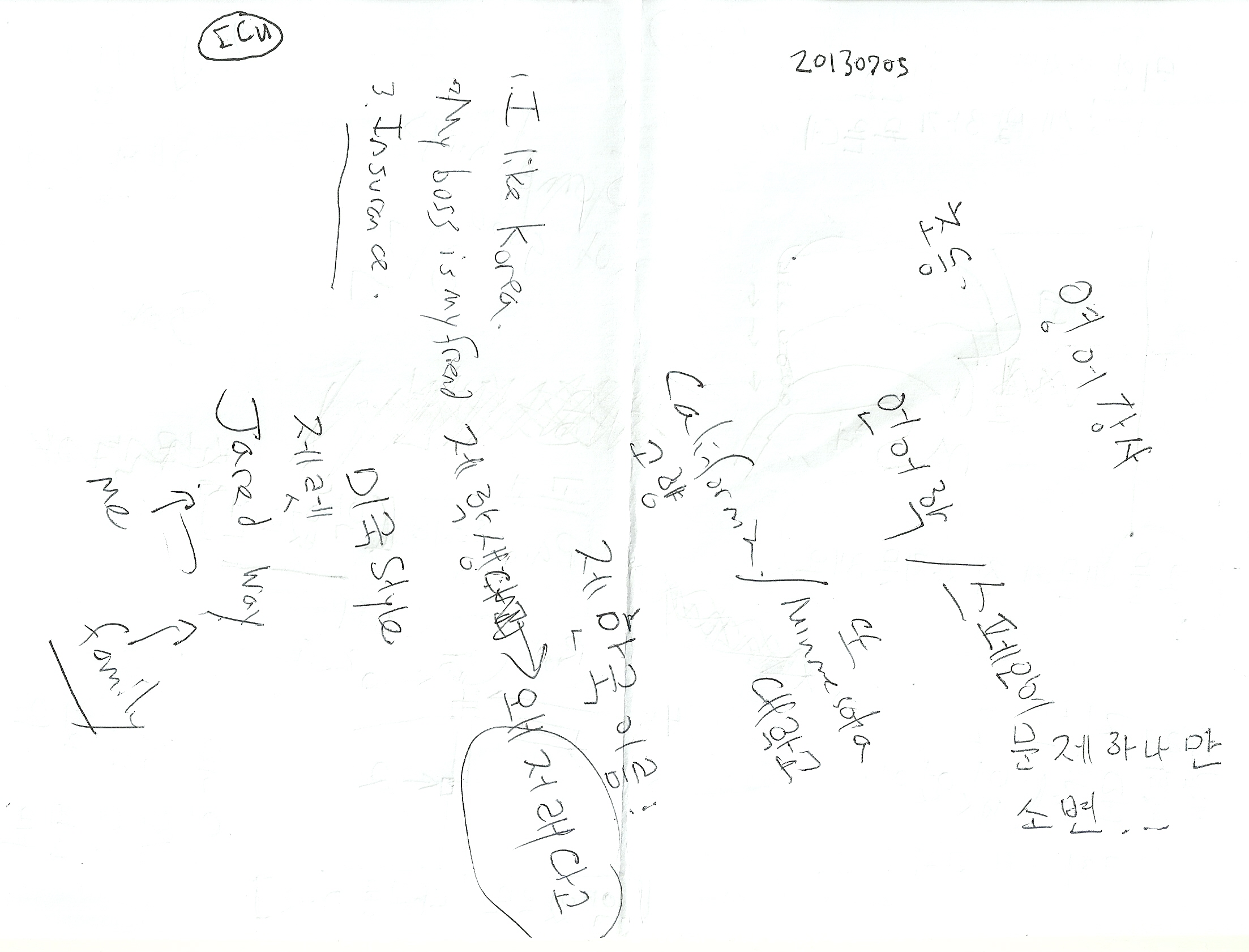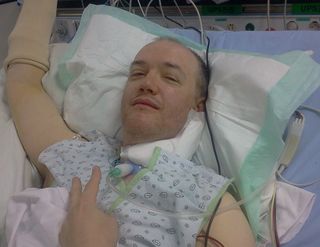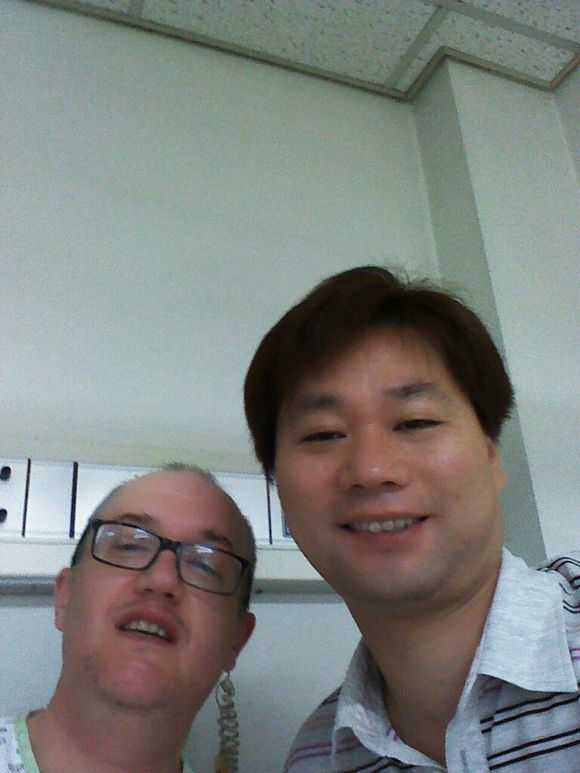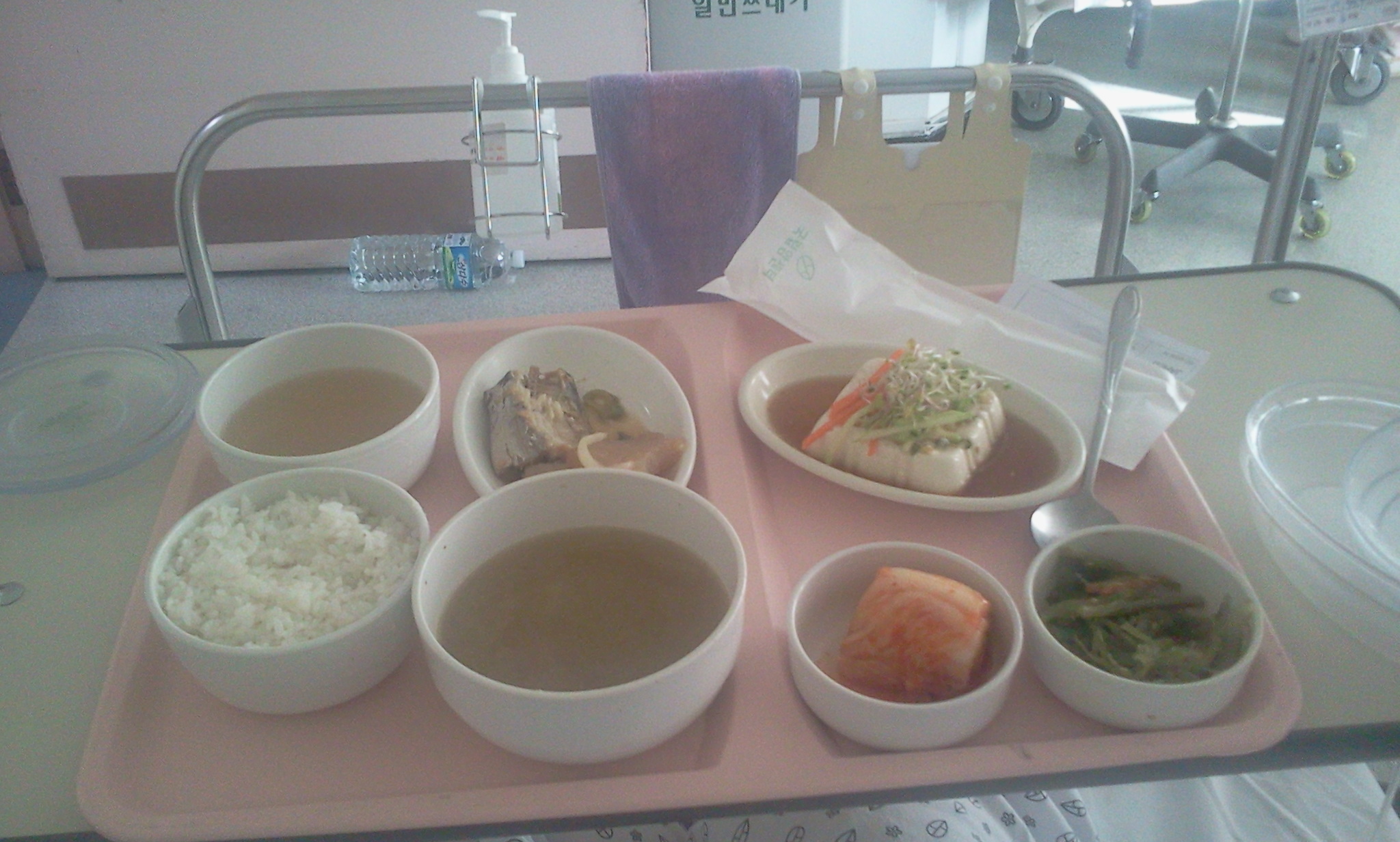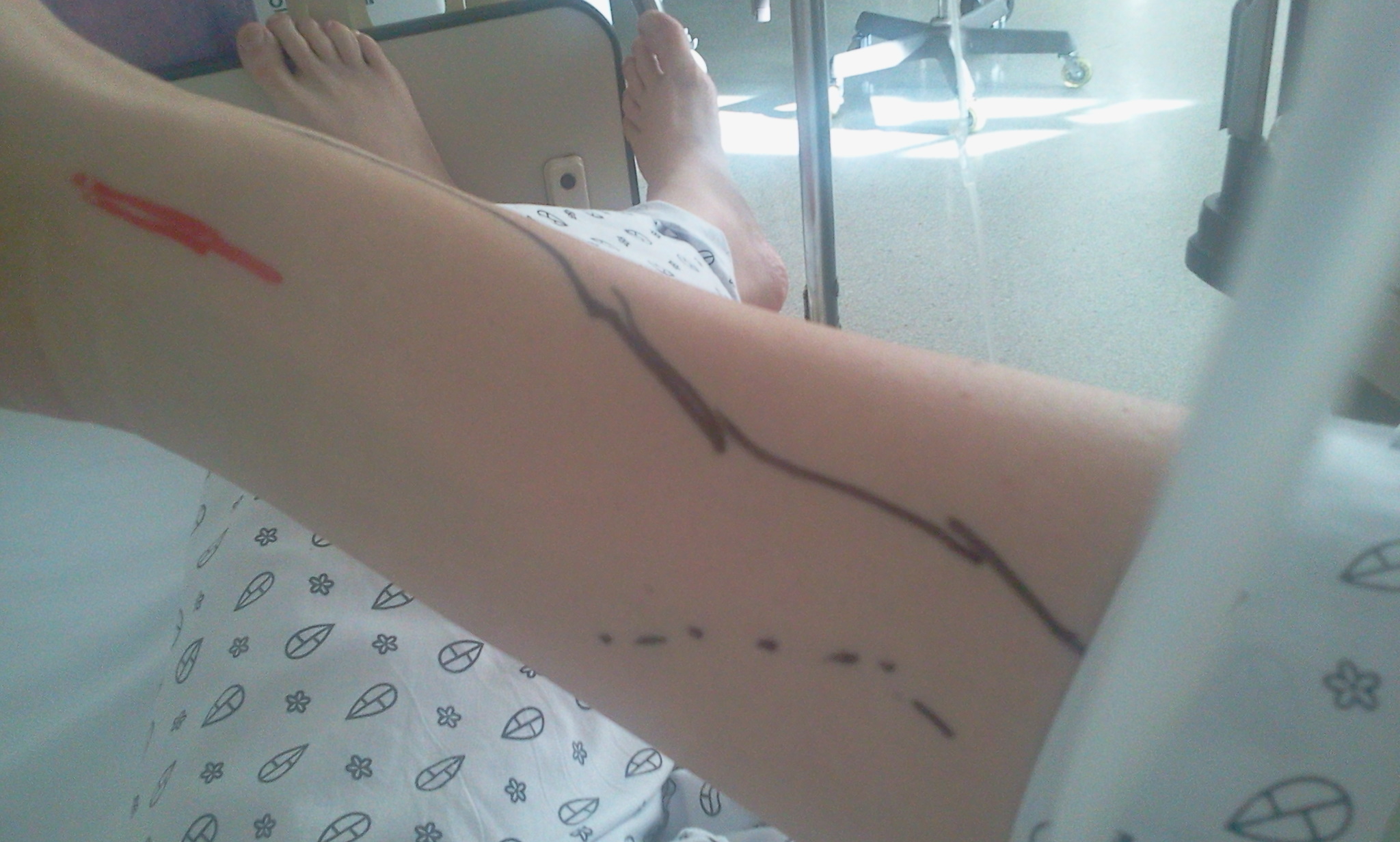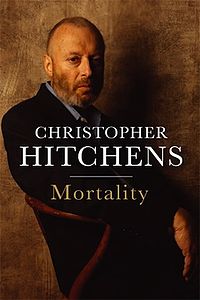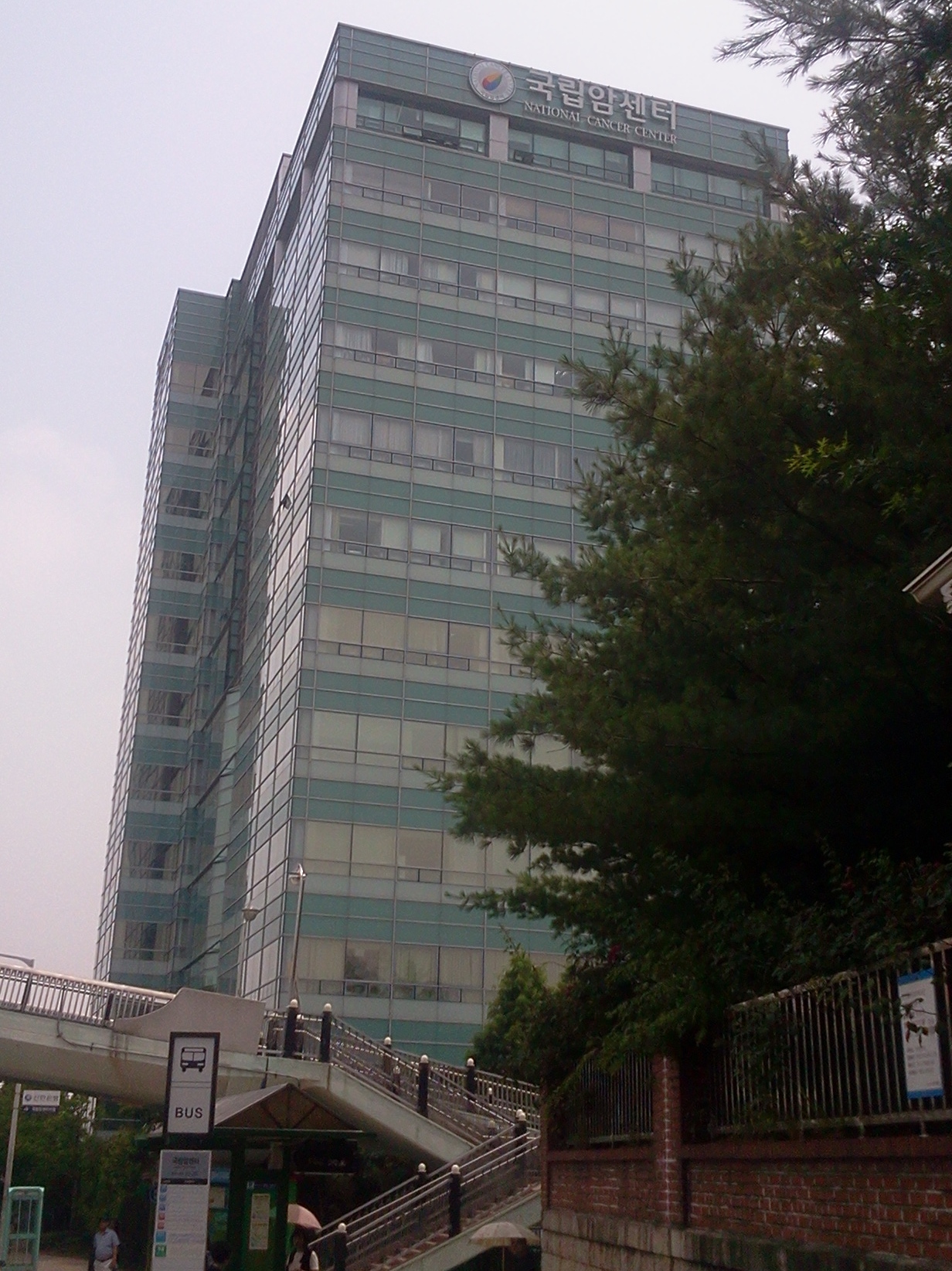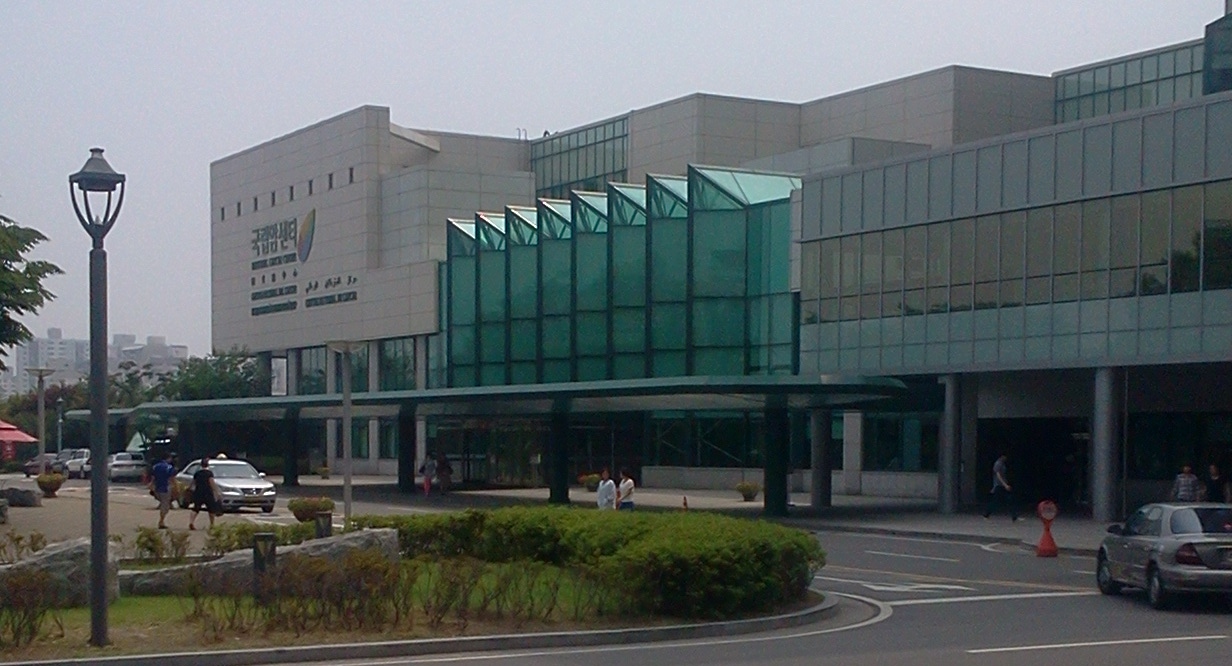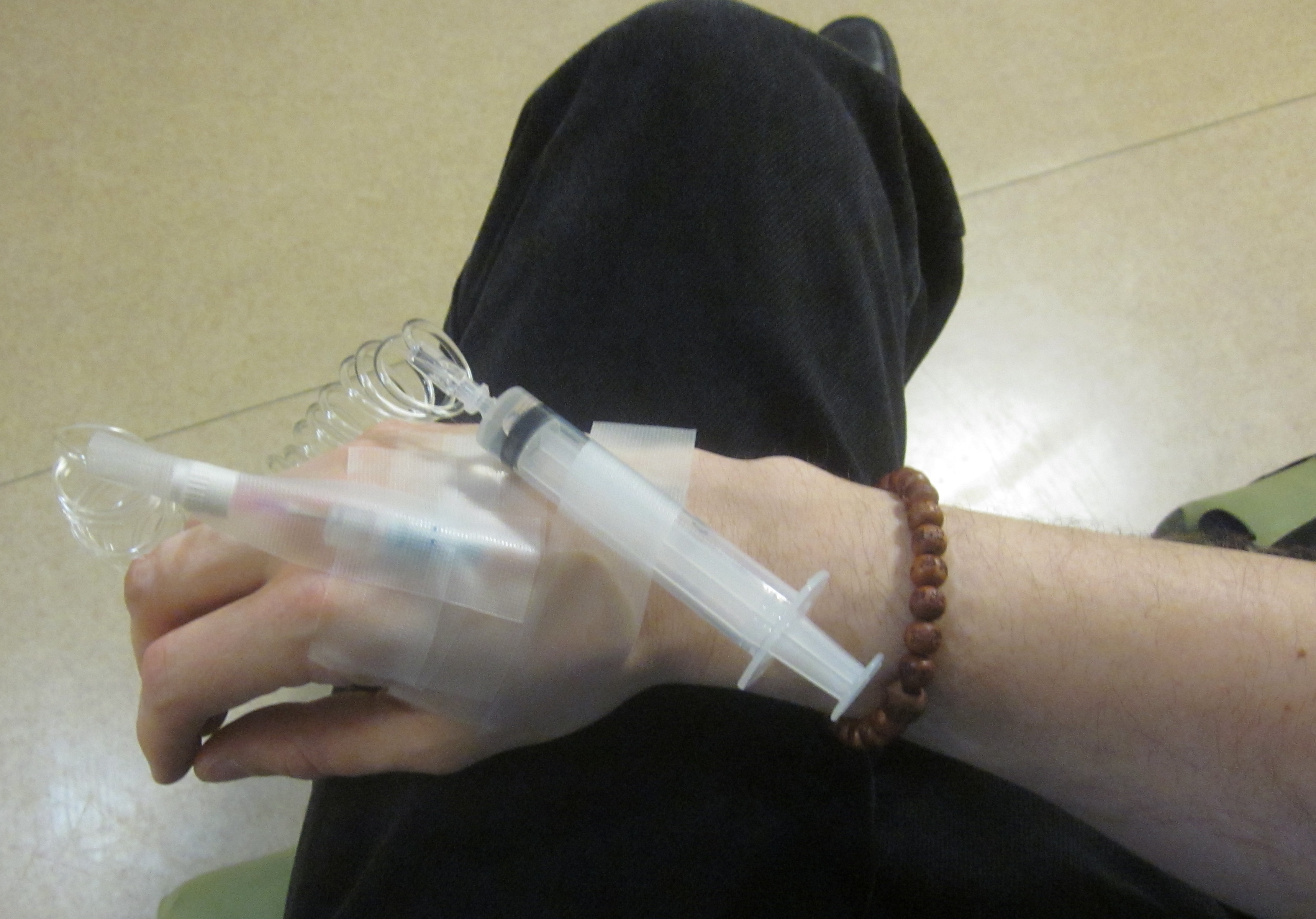[This post and the others on this topic was written on paper in fragments or even less – single word prompts for ideas – at the time of the events – and assembled later. It’s taken a while to put things together… not through any particular emotional difficulty but just lacking the energy and willpower to do much in the weeks right after the surgery, in addition to a certain perfectionism with respect to the project which I’ve now managed to finally abandon .]
Fourth Shift Word: Lucidity
My fourth shift in the ICU was an evening shift. I was assigned a fairly inexperienced nurse and I think she’d drawn me because I’d developed a reputation by then of being a relatively “easy” patient. Probably this nurse, along with the now forgotten first shift nurse, was the nurse with whom I developed the least rapport. I became very interiorized during this shift, and my proprioception began returning and I finally figured out a clear map of my surgery points and tube insertion points.
The real problem I had, more than any other, during my time in the ICU, was with the phlegm and liquid draining at the back of my throat and down into my lungs. I’ve always had a bit of a snoring problem, and possibly (though never diagnosed), it’s easy to imagine I have had episodes of mild sleep apnea, too. So combine that with an oxygen tube through a tracheotomy and major surgery on my neck and throat and tongue, and you can see how this could become truly terrible.
I was becoming sleep-deprived, because I couldn’t just snore my way through the post-nasal-drip obliviously, as was my normal custom. The phlegm would build at the back of my throat, but it was sufficiently difficult and painful to swallow that each time I swallowed, I was unable to do it involuntarily, and would have to jolt fully awake. On the other hand, if I just let it drip down into my lungs and didn’t swallow, I would end up with liquid in my lungs such that every hour or so I needed “suction” (석션) – a truly horrible invention that the US Government has probably used in combination with their exciting waterboarding program. They shove a snakey suction device down through your tracheal hole and vacuum the juice out of your lungs. It hurts worse than most anything I’ve ever experienced even when done gently, and some nurses weren’t so gentle, either.
So it was a Scylla and Charybdis dilemma: either swallow every few minutes to redirect the phlegm to my stomach, and stay awake to do so, or not swallow and be vacuumed out every hour.
This evening, I had decided I preferred sleep deprivation to pain. So I began to experiment.
I found that I needed to swallow, on average, every 12 or so breaths. I began counting my breaths, and saying short affirmations on each breath. I had this idea that I could “sleep” between swallows. It went like this. I would fix a smile on my face – my “fake Buddha smile” as I call it. Then, begin:
1. breathe in. i am strong. breathe out.
2. breathe in. i am healthy. breathe out.
3. breathe in. i am fearless. breathe out.
4. breathe in. i am dreaming. breathe out.
5. breathe in. i am strong. breathe out.
6. breathe in. i am healthy. breathe out.
7. breathe in. i am fearless. breathe out.
8. breathe in. i am dreaming. breathe out.
9. breathe in. i am strong. breathe out.
10. breathe in. i am healthy. breathe out.
11. breathe in. i am fearless. breathe out.
12. breathe in. i am dreaming. breathe out.
swallow.
repeat.
Over hours, I perfected this, and found that I could actually fall asleep, in a weird, weird way, saying this “mantra.” Each time I would utter the word “dreaming” I could feel my mind snapping into that REM state, and the coherence of my consciousness dissolving. It was quite remarkable. And yet I remained utterly “vigilant” of the situation around me – I heard the nurses, I heard what was going on, I felt the phlegm building at the back of my throat. And the images that would come in the “dreaming” moments were somewhat guided. I could dream about things that I chose – guided imagery.
I know I freaked out some nurses. I would have my eyes closed, sitting slumped in my bed, to all appearances asleep, but when they approached, before they touched me to take my vitals or do some thing or another, I would hear them, and I would snap “awake” and be regarding them, smiling. Utterly aware of my surroundings, yet sleeping, every 12th breath.
I have experimented a little with trying to repeat this experience since then, but I haven’t really pushed that hard, and it’s too easy, now, to “fall asleep” for real. Over time, I intend to explore the relationship between meditation and dreaming and lucid dreaming and semi-dreaming.
Here are a pair of sheets I’m pretty sure I wrote during my 4th shift.
This picture I’m trying to explain my post-nasal-drip problem.
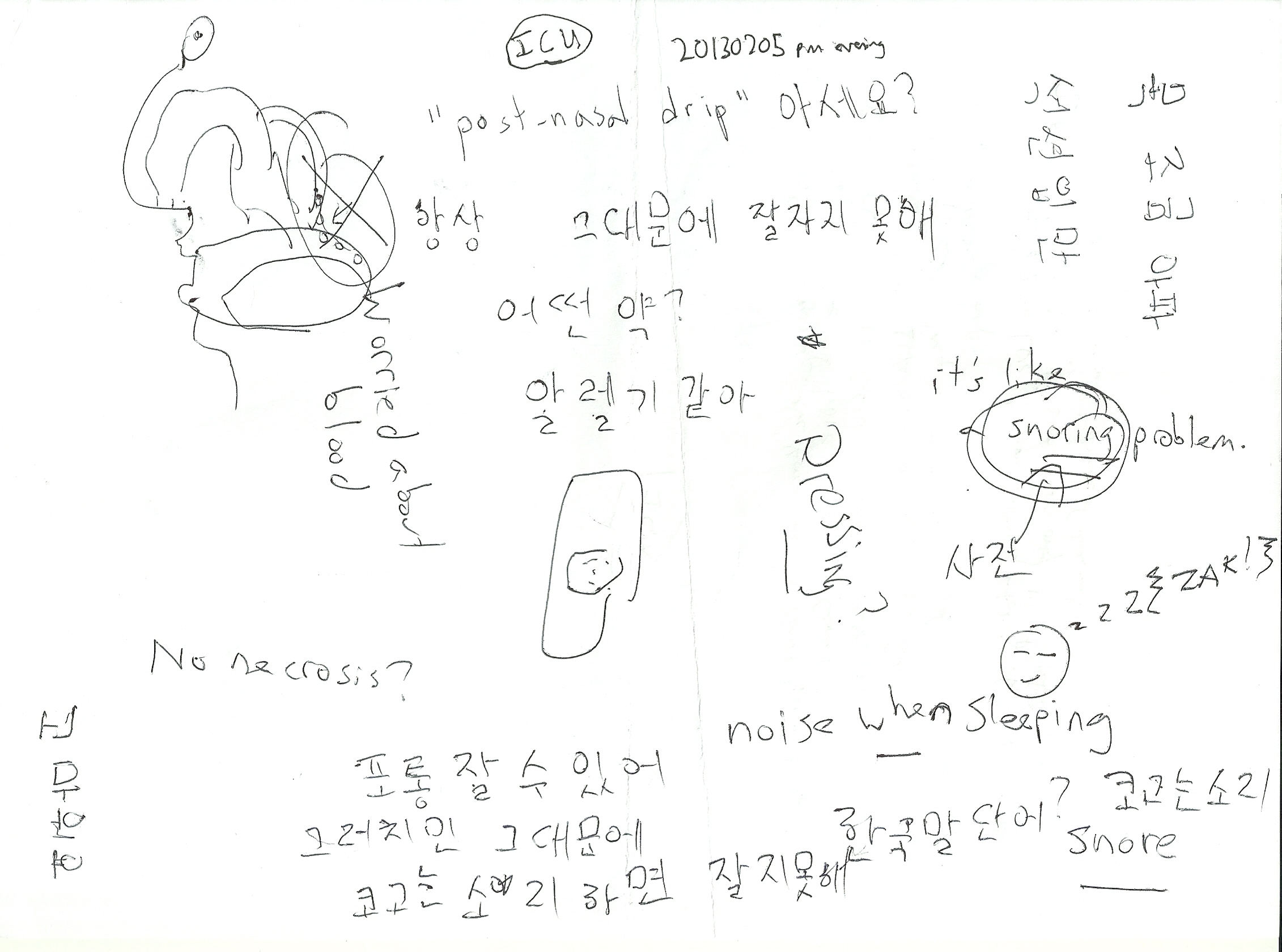
This second picture is more of that, but also I think I made a very interesting “body pain map” in the center bottom – I was rating the pain of the different locations on my body – it really wasn’t that bad, note that I wrote carefully next to the head of the pain map “약없으면” which is my pidgin Korean for “when I’m not taking pain medicine,” while below I wrote “약있으면 다고통 0~2” = “when medicine all pain 0~2.” The pain medicine was working just fine.
